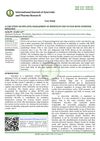 May 2023 in “International journal of Ayurveda and pharma research”
May 2023 in “International journal of Ayurveda and pharma research” Ayurvedic treatment helped a woman with PCOS conceive and deliver a healthy baby.
7 citations,
May 2014 in “Iranian Red Crescent medical journal” Laser hair removal is effective for hirsutism when combined with treatment for the underlying causes.
 February 2020 in “International Journal of Advanced Research”
February 2020 in “International Journal of Advanced Research” The Garcinia Cambogia Nutri Bite could help manage PCOS symptoms.
 26 citations,
February 2011 in “Anais Brasileiros De Dermatologia”
26 citations,
February 2011 in “Anais Brasileiros De Dermatologia” Polycystic Ovary Syndrome can cause hair loss and skin issues, and early treatment is important for preventing complications.
 11 citations,
February 2008 in “British journal of nursing”
11 citations,
February 2008 in “British journal of nursing” Idiopathic hirsutism causes excessive hair growth in women, can be treated with medication and hair removal, but cannot be fully reversed.
 38 citations,
July 2012 in “international journal of endocrinology and metabolism”
38 citations,
July 2012 in “international journal of endocrinology and metabolism” Some plant-derived compounds may help with hormonal conditions, but more research is needed to confirm their effectiveness.
 December 2023 in “Current psychosomatic research”
December 2023 in “Current psychosomatic research” Psychological interventions can improve the quality of life for women with PCOS.
 September 2023 in “IP Journal of Nutrition, Metabolism and Health Science/IP Journal of Nutrition Metabolism and Health Science”
September 2023 in “IP Journal of Nutrition, Metabolism and Health Science/IP Journal of Nutrition Metabolism and Health Science” Recognizing and managing hirsutism, alopecia, and acne is crucial for improving wellbeing in women with PCOS.
 October 2013 in “Springer eBooks”
October 2013 in “Springer eBooks” PCOS is a hormonal disorder causing infertility and menstrual problems, often linked to obesity and can lead to acne, treated with hormonal and insulin-sensitizing medications.
 85 citations,
June 2008 in “Annals of the New York Academy of Sciences”
85 citations,
June 2008 in “Annals of the New York Academy of Sciences” PCOS starts in adolescence with hormonal issues, leading to adult health problems, and early treatment is crucial.
 September 2002 in “Fertility and sterility”
September 2002 in “Fertility and sterility” Female relatives of PCOS patients have a higher chance of showing PCOS symptoms.
 183 citations,
March 1982 in “JAMA”
183 citations,
March 1982 in “JAMA” Spironolactone is a safe and effective treatment for reducing excessive hair growth in women.
 21 citations,
June 2016 in “Reproductive Sciences”
21 citations,
June 2016 in “Reproductive Sciences” Women with PCOS, especially those overweight, have higher levels of IL-18 in their endometrium, which may affect fertility.
 1 citations,
August 2023 in “Diagnostics”
1 citations,
August 2023 in “Diagnostics” Women with PCOS are more likely to develop kidney stones, especially those with certain PCOS types.
 61 citations,
June 2016 in “Clinical Medicine”
61 citations,
June 2016 in “Clinical Medicine” PCOS is often linked to insulin resistance and obesity, and weight loss can improve symptoms.
 14 citations,
January 2018 in “Endocrinology and Metabolism”
14 citations,
January 2018 in “Endocrinology and Metabolism” Many infertile women with PCOS in Central Vietnam have metabolic or insulin resistance syndrome, with obesity and older age increasing the risk.
 9 citations,
January 2022 in “Reproductive Biology and Endocrinology”
9 citations,
January 2022 in “Reproductive Biology and Endocrinology” High levels of male hormones and irregular periods best predict how well PCOS patients will respond to metformin treatment.
 135 citations,
April 2017 in “Advances in Clinical and Experimental Medicine”
135 citations,
April 2017 in “Advances in Clinical and Experimental Medicine” New treatments for PCOS show promise, including both medication and non-medication options.
 26 citations,
January 2000 in “Hormone research in paediatrics”
26 citations,
January 2000 in “Hormone research in paediatrics” Insulin resistance is linked to high male hormone levels in women, often seen in those with PCOS.
 December 2022 in “Cumhuriyet medical journal”
December 2022 in “Cumhuriyet medical journal” Different PCOS subgroups have similar metabolic features, but those without menstrual problems have milder issues.
 4 citations,
October 2022 in “Nutrients”
4 citations,
October 2022 in “Nutrients” Personalized diets, like the Mediterranean Diet and low carb diets, can help manage PCOS symptoms in obese women, and probiotics may enhance weight loss and improve metabolic health. More research is needed to find the best diet strategies.
 1 citations,
April 2022 in “Annals Academy of Medicine Singapore”
1 citations,
April 2022 in “Annals Academy of Medicine Singapore” PCOS care in Singapore can be bettered by refining referral systems, standardizing diagnosis and treatment, enhancing complication screening, and offering educational resources for clinicians.
 18 citations,
March 2015 in “Journal of Endocrinological Investigation”
18 citations,
March 2015 in “Journal of Endocrinological Investigation” The research suggests that the ZP4 gene is linked to egg development in women with PCOS but requires more study to understand its role in infertility.
 28 citations,
November 2014 in “Current Diabetes Reports”
28 citations,
November 2014 in “Current Diabetes Reports” Girls with PCOS during adolescence have a higher risk of developing type 2 diabetes, and early treatment can help manage this risk.
 1 citations,
May 2021 in “International Journal Of Medical Science And Clinical Invention”
1 citations,
May 2021 in “International Journal Of Medical Science And Clinical Invention” Women with PCOS may have a higher risk of severe COVID-19 due to hormonal imbalances and vitamin D deficiency.
 14 citations,
January 2018 in “Advances in Clinical Chemistry”
14 citations,
January 2018 in “Advances in Clinical Chemistry” The document concludes that hormonal biomarkers are key for diagnosing hyperandrogenemia in women and hypogonadism in men.
16 citations,
January 2014 in “Obesity surgery” Vertical sleeve gastrectomy improved metabolism, behavior, and reproduction in obese rats with PCOS.
 43 citations,
October 2019 in “Pediatric Research”
43 citations,
October 2019 in “Pediatric Research” Lifestyle changes are the main treatment for PCOS, which is a complex condition requiring early management to reduce its health impacts.
 7 citations,
August 2019 in “Endokrynologia Polska”
7 citations,
August 2019 in “Endokrynologia Polska” The free androgen index varies among women with different types of PCOS.
 257 citations,
July 2018 in “Obstetrics & Gynecology”
257 citations,
July 2018 in “Obstetrics & Gynecology” PCOS is a complex disorder in women that can lead to various health risks and requires personalized treatment.




























